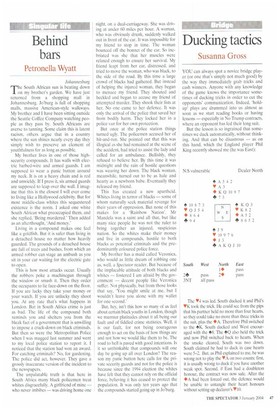Behind bars
Petronella Wyatt
Johannesburg
The South African sun is beating down on my brother's garden. We have just returned from a shopping mall in Johannesburg. Jo'burg is full of shopping malls, massive American-style walkways. My brother and I have been sitting outside the Seattle Coffee Company watching people as they pass by. South Africans are averse to tanning. Some claim this is latent racism, others argue that in a country where the sun shines nearly every day they simply wish to preserve an element of youthfulness for as long as possible.
My brother lives in one of those highsecurity compounds. It has walls with electric barbed-wire and armed guards. I am supposed to wear a panic button around my neck. It is on a heavy chain and is red and unwieldy. If I press it, six armed guards are supposed to leap over the wall. I imagine that this is the closest I will ever come to living like a Hollywood celebrity. But for most middle-class whites this sequestered existence is the norm. I asked one white South African what preoccupied them, and she replied, 'Being murdered.' Then added as an afterthought. 'And money.'
Living in a compound makes one feel like a goldfish. But it is safer than living in a detached house no matter how heavily guarded. The grounds of a detached house are full of trees and bushes, from which an armed robber can stage an ambush as you sit in your car waiting for the electric gate to open.
This is how most attacks occur. Usually the robbers poke a machinegun through the window or smash it. Then they order the occupants to lie face-down on the floor. If you are lucky they take your money or your watch. If you are unlucky they shoot you. At any rate that's what happens in London. But in South Africa crime is just as bad. The life of the compound both reminds you and shelters you from the bleak fact of a government that is unwilling to impose a crack-down on black criminals. But then so were the Metropolitan Police when I was mugged last summer and went to my local police station to report it. I noticed that the station had won an award. For catching criminals? No, for gardening. The police did act, however. They gave a grossly inaccurate version of the incident to the newspapers.
The unpalatable truth is that here in South Africa many black policemen treat whites disgracefully. A girlfriend of mine — who never imbibes — was driving home one night, on a dual-carriageway. She was driving at under 60 miles per hour. A woman, who was obviously drunk, suddenly walked Out in front of the car. It was impossible for my friend to stop in time. The woman bounced off the bonnet of the car. So inebriated was she that her muscles were relaxed enough to ensure her survival. My friend leapt from her car, distressed, and tried to move the woman, who was black, to the side of the road. By this time a large crowd of blacks had gathered. But instead of helping the injured woman, they began to menace my friend. They shouted and heckled and began to accuse my friend of attempted murder. They shook their fists at her. No one came to her defence. It was only the arrival of the police that saved her from bodily harm. They locked her in a police van for her own protection.
But once at the police station things turned ugly. The policemen accused her of hit-and-run. She pointed out that this was illogical as she had remained at the scene of the accident, had tried to assist the lady and called for an ambulance. Bullishly, they refused to believe her. By this time it was midnight and the rain of hostile questions was wearing her down. The black woman, meanwhile, turned out to be as hale and hearty as a newborn babe. Eventually they released my friend.
This has created a new apartheid. Whites living in terror of blacks — some of whom naturally seek material revenge for their years of oppression. But none of this makes for a 'Rainbow Nation'. Mr Mandela was a saint and all that, but like many nice people he was not the ruler to bring together an injured, suspicious nation. So the whites make their money and live in compounds, hostile to both blacks as potential criminals and the predominantly coloured police force.
My brother has a maid called Veronica, who would as little dream of robbing one as, well. a Spectator reader. But because of the implacable attitude of both blacks and whites — fostered I am afraid by the government — decent people like Veronica suffer. Not physically, but from those looks that say, 'You might smile at me, but I wouldn't leave you alone with my wallet for one second.'
But, hey, isn't this how so many of us feel about certain black youths in London, though we murmur platitudes about it all being our fault and of fiddled crime statistics. Well, it is our fault, for not being courageous enough to act on the basis of how things are and not how we would like them to be. The road to hell is paved with good intentions. Is it so unthinkable that compounds will one day be going up all over London? The reason my panic button here calls for the private security guards and not for the police is because since the 1994 election the whites have felt that they cannot rely on the official force, believing it has ceased to protect the population. It was only ten years ago that the compounds started going up in Jo'burg.


























































 Previous page
Previous page